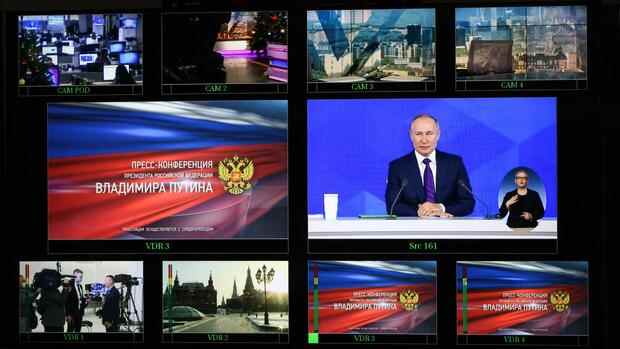Many people in Russia get most of their information from pro-government media.
(Photo: imago images/ITAR-TASS)
Moscow If you are a Russian loyal to the Kremlin and tune in to state television these days, the world is fine for you. For example, on Sunday, the 11:00 a.m. news of Rossiya-1 shows the surrender of the last Ukrainian fighters from the Mariupol Steel Plant. You can see men with long beards, pale faces and swastika tattoos.
The news anchor claimed that they completely mined the city. But to calm her down, she immediately adds that it’s over now. “Azovstal is completely purged of the Ukrainian nationalists.”
The alleged liberation of Ukraine from “fascists” and “Nazis” is Moscow’s main justification for the war of aggression against the neighboring country that has now lasted more than three months. The fact that fighters from the Azov regiment, which is actually dominated by right-wing extremists, also surrendered in Mariupol is almost a gift for Russia’s state television. One can spend a whole day in front of the screen without seeing or hearing any dissenting opinions.
The fact that the Azov members are only a fraction of the women and men fighting is not mentioned by the media loyal to the Kremlin. Nor is it that the Russian and pro-Russian military are often responsible for the deaths and suffering of civilians. And certainly not that Mariupol became an international symbol for the brutality of the Russian war of aggression after weeks of siege.
Top jobs of the day
Find the best jobs now and
be notified by email.
According to surveys, the war is supported by the majority of the approximately 146 million Russians. To regard all these people as helpless victims of state propaganda would be too simplistic. Critical Russian-language news channels continue to exist – even if they can often only be reached via detours such as alternative Internet connections. At the same time, the internet is often poor or non-existent, especially in the provinces. Those who cannot or do not want to accept criticism only see what the Kremlin wants to tell them.
“The boys are great guys”
This afternoon it’s something like this: The Cherson region – where the population repeatedly protested against the Russian occupiers – is now “cleansed”. A reporter shows how pro-Russian fighters are trained on weapons. “The boys are great guys,” says an instructor. The reporter describes a tank that was probably left behind by Ukrainian soldiers as a “trophy”. Even a field sauna has been set up, he says, trudging through a wooded area with the microphone in his hand.
Between the news there is a music show. There is singing, dancing, laughing. The war – or rather the “military special operation”, as it is called here – seems far away. Criticism of the actions of the armed forces is taboo.
According to a new law, anyone who dares to do so risks up to 15 years in prison. All the more attention was paid to actions such as that of Marina Ovsyannikova, the editor who had been loyal to the line until then, who jumped into the picture with an anti-war poster during the main news broadcast of the first channel.
The Kremlin does not allow criticism of the Russian war of aggression in the state media.
(Photo: dpa)
On this day, there are no such incidents. In the evening weekly review, pictures from the particularly hard-fought east of Ukraine are shown. The viewers of Rossiya-1 do not see that according to experts, their own army has been suffering high losses for weeks and has completely underestimated the resistance of the Ukrainians.
Instead, they hear from a soldier in the Luhansk region: “We fulfill all tasks – until victory”. Then they see footage of Russian National Guardsmen running physical education classes for children in conquered territories, rescued pets, and people waving Russian flags.
More Handelsblatt articles on this topic:
The end of the day is Vladimir Solovyov’s talk show – critics describe him as one of the Kremlin’s most important propagandists. Again it is about Mariupol. Solovyov first mimics Ukrainian President Volodymyr Zelensky, then pokes fun at the last defenders of the city on the Azov Sea. Kremlin boss Vladimir Putin didn’t even begrudge them a hero’s death, he scoffs. “You have taken yourself into captivity. Just put your paws up and surrender.”
Among Solovyov’s eight guests that evening is the editor-in-chief of the state broadcaster RT, Margarita Simonyan. She calls Ukrainians “cowards” with no morals. “Look how they surrendered – in green underpants,” she calls out to shots of almost naked men who have to be undressed and searched in front of their opponents on the street. “They surrendered because they are Nazis,” says Simonyan with satisfaction. “And Nazis always surrender.”
More: G7 idea: Russian oligarchs can buy their way out of sanctions with their billions
